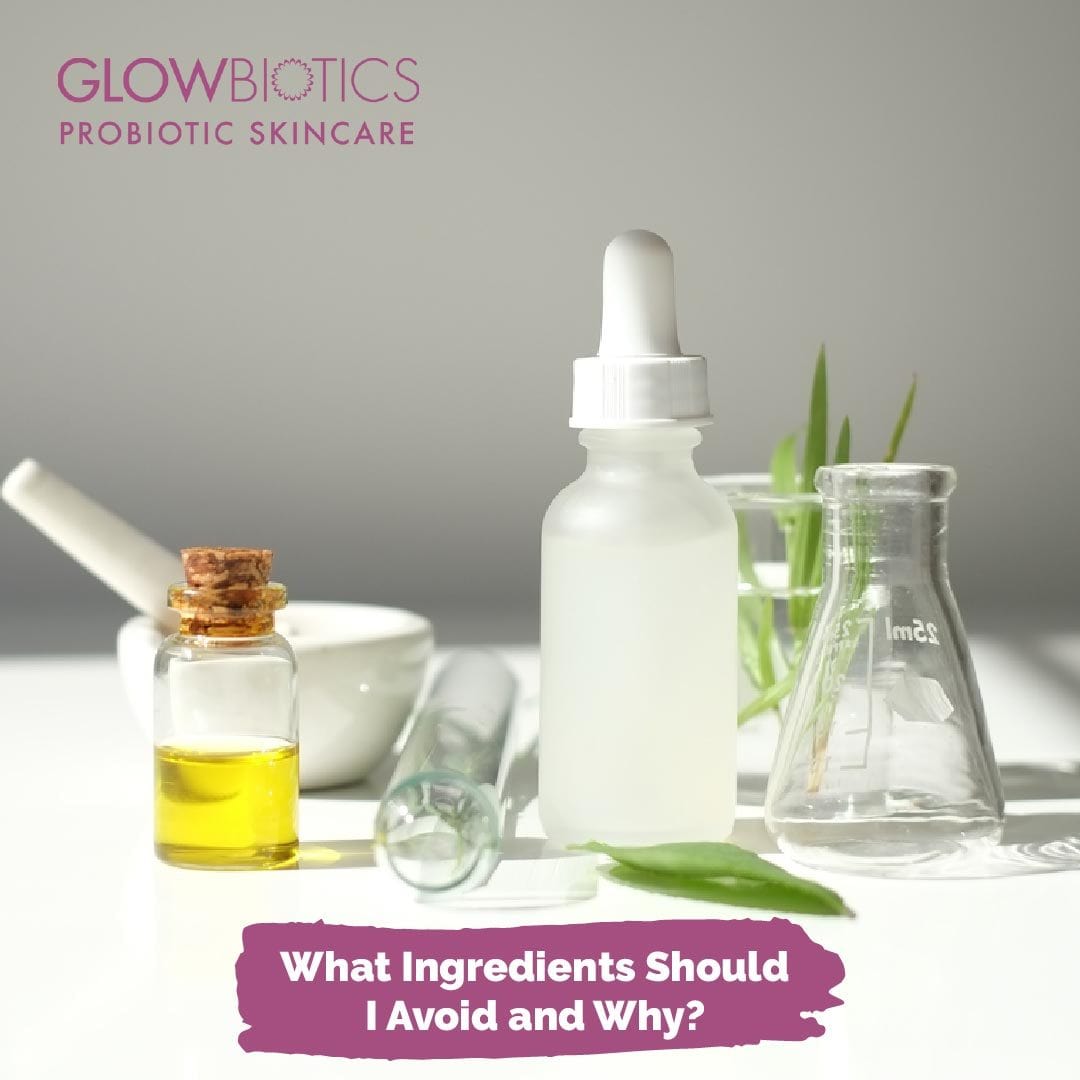(Parabens, Phthalates, Sulfates, Artificial dyes and any known cancer-causing ingredient.)
You're trying to do the best you can for your skin. You *try* to eat a diet to support your skin's health. You spend hours pouring over articles and information about the latest and best ingredients to tend to your particular skincare needs. You handpick your skincare regimen to provide your skin with exactly what it needs, regardless of the circumstances.
But are you digging even deeper? While you're paying attention to ingredients you want to look for, are you also putting just as much time into understanding exactly which ingredients you should avoid in your skincare?

Are There Really Skincare Ingredients I Should Avoid?
Right. That sounds counterintuitive, doesn't it? I mean, why should a company do their best to include quality actives in their products if they're also just going to include ingredients that are harmful and irritating?
Really, when it comes down to it, it's all about the bottom line. Much of the lesser-desired ingredients are inexpensive for companies to include.
Many of these ingredients are absorbed through the skin when you use the products. Strikingly, the human body can absorb as much as five pounds of cosmetic chemicals every year. Considering there's a range of harmful side effects from these chemicals, it would probably be best to be a little picky about what's in your skincare products.
So what are some of the worst offenders? What are the top skincare ingredients you should steer clear of?

Parabens
The Upside
Parabens are synthetic preservatives found in all sorts of things; from foods to pharmaceuticals, cosmetics, and personal care products like deodorant and shampoos - probably most of your old favorites. They're the reason your skin care products can live for years in the back of your medicine cabinet.
The Low-Down
When parabens penetrate the skin, they can remain within the tissue. They're not necessarily disclosed on every product, because they could be in 'fragrances,' so you may not know when you're exposed.
Parabens can mimic hormones in your body, disrupting your endocrine system. The imbalance can trigger an increase in breast cell division and growth of tumors, which is why they've been linked to a string of health problems like breast cancer and male reproductive issues. The list includes breast cancer, early puberty, and decreased sperm levels.
They're not very good for your skin either, since they increase sensitivity to the sun, causing premature aging.
Phthalates
The Upside
You can pretty much find phthalates in just about everything, too. They're used as a plasticizer (like in nail polish to help reduce cracking), in hairsprays (to keep stiffness at bay), and as a solvent and fixative in fragrances.
You'll see them listed as DBP, DEMP, DMP, DEP, or variations on dibutyl/diethyl ester. Look for anything with the suffix -phthalate.
The Low-Down
Phthalates can mimic estrogen, which disrupts the delicate hormonal balance. Suspected carcinogens, studies have linked them to breast cancer, skin cancer, and a decreased sperm count. They're toxic to fetuses, causing birth defects in male babies, and have been linked to possible endometriosis, polycystic ovary syndrome, diabetes, obesity, and ADHD. While the proof seems to be irrefutable, the FDA still has yet to acknowledge phthalates as "harmful."
Sulfates
The Upside
Sulfates are typically found as cleansing agents in skincare and hair-care products. They're responsible for creating the lather, and they remove dirt and oil.
You may recognize them as sodium lauryl sulfate, ammonium lauryl sulfate, and sodium laureth sulfate.
The Low-Down
Some sulfates are synthetic, others are obtained from natural sources like coconut or palm oils. Yet others may be derived from sulfur- and petroleum-based products. Sulfates are cheap to use, so they're an easy win for cleansers, but if left on the skin for an extended period of time, can be sensitizing. They've been shown to be irritating to the eyes and skin of some people. Sulfates penetrate the scalp quickly and the liver isn't able to metabolize them. As endocrine disruptors, they're believed to contribute to acne.

Artificial Dyes
The Upside
Pretty.
That's it.
We like things that are clean-appearing or of pleasing colors.
The Low-Down
These dyes are often made up of a variety of synthetic chemicals - you could find dozens in one single dye, which makes it very difficult to have a good handle on exactly what you're exposing your body to. Many are made from coal tar, and some may contain heavy metal salts like lead.
The toxins they leave behind on your skin can increase your risk of sensitivity and irritation. They can also block pores. Many dyes have already been banned from use in food because of their link to health problems, but there are far fewer restrictions on what can be used in skincare products.
Other Ingredients to Be Avoided
While this is a list of some of the worst offenders, it's by no means exhaustive. There's a long list of ingredients commonly found in your products that should ultimately be avoided. Many of them are known cancer-causing agents like the formaldehydes and formaldehyde-releasing substances, or are often contaminated with impurities that can cause cancer, like with petroleum products.
That's why it's good to have a quality skincare lineup you can trust. It isn't enough to use products that are full of powerful ingredients to care for your troubled skin. GLOWBIOTICS carries the power you need, but the line of products are completely paraben free, sulfate-free, artificial dyes, phthalates, mineral oils, xenoestrogens and any other harmful chemicals.

